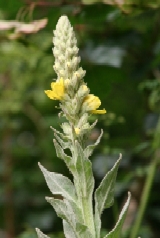

|
Aaron's Rod
Verbascum
thapsus
Other
Names:
Common Mullein, Great Mullein, Candlewick
Plant, High Taper
Distribution:
A native British wild flower, which is fairly common throughout
Britain
Habitat:
It thrives on grassland, banks and dry fields & pastures in
sunny sites
Description:
Biennial.
Tall, straight flower spikes in the second year from June to
August. In the first year
the leaves form a rosette, but in the second year the stem extends from
the rosette and leaves alternate along it. The flower spikes have
individual yellow flowers along the stem. The
leaves have a downy whitish coating of tiny hairs.
Uses:
In early days the downy coating from the leaves was scraped off
and used to make candle wicks. At
country gatherings the whole stem was set alight and used as a torch.
The flowers can be used as a yellow hair dye.
Although most of the plant is poisonous, the dried flowers were
once used to make a fruity flavoured medicine which was thought to
relieve coughs and chills.
Wildlife:
This is the food plant of the Mullein
Moth.
Sowing
Instructions for Seeds: Sow seed in late spring to
early summer in a cold frame and lightly cover with compost.
Germination usually takes 2-3 weeks, but is dependent on
temperature. When the seedlings are large enough to handle, prick
them out into individual pots and plant them out in late summer for
flowering the following year. The seed has a long viability if
stored in a cool, dry environment.
Our
plants and seeds are of native British origin.
|


